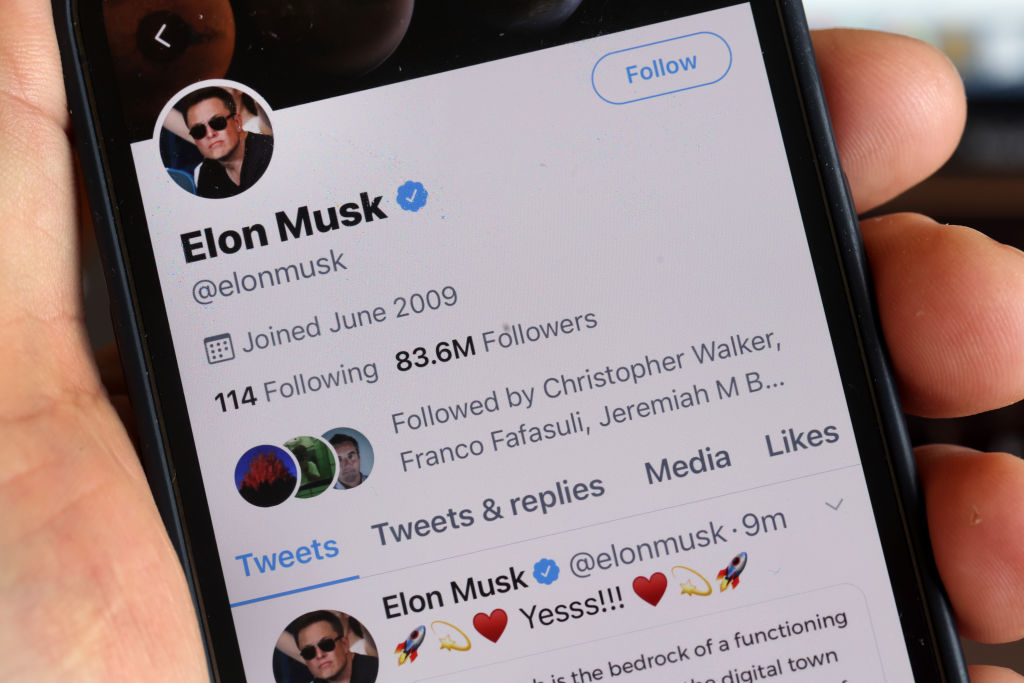He did it. It’s done. Let the chaos commence! Twitter’s Board of Directors officially accepted Elon Musk’s proposal of $54.20 per share in cash, allowing the billionaire TechnoKing and Dogefather to successfully take over the social media platform and put another feather in his cap of business accomplishments. As expected, conservatives are cheering the news, the mainstream media is whining about the acquisition, and leftists are promising to abandon the Twitterverse because now an open exchange of ideas will likely be present on the website. But there is a lot that still needs to be done before the agreement is finalized, and many questions will need to be answered.
Get Down to the Brass Tacks
 Twitter confirmed that it accepted Musk’s $44 billion offer. Once the transaction has been completed, the tech firm will turn into a privately held company upon receipt of regulatory and shareholder approval. According to the deal’s provisions, Twitter shareholders will receive $54.20 in cash for every share of Twitter common stock they own upon the closing of the deal, representing a 38% premium for investors.
Twitter confirmed that it accepted Musk’s $44 billion offer. Once the transaction has been completed, the tech firm will turn into a privately held company upon receipt of regulatory and shareholder approval. According to the deal’s provisions, Twitter shareholders will receive $54.20 in cash for every share of Twitter common stock they own upon the closing of the deal, representing a 38% premium for investors.
Bret Taylor, the company’s independent board chair, noted in a statement that corporate heads “conducted a thoughtful and comprehensive process,” concluding that the cash offer would be “the best path forward for Twitter’s stockholders.” Twitter CEO Parag Agrawal emphasized how proud he is of the company’s staff.
Musk spotlighted his drive to return free speech and trust to the platform and create new features. “Free speech is the bedrock of a functioning democracy, and Twitter is the digital town square where matters vital to the future of humanity are debated,” he said in a statement. “I also want to make Twitter better than ever by enhancing the product with new features, making the algorithms open source to increase trust, defeating the spam bots, and authenticating all humans. Twitter has tremendous potential – I look forward to working with the company and the community of users to unlock it.”
Twitter shares rallied 5.66% on the April 25 trading session, climbing to $51.70 a share. Since it was revealed Musk had purchased a 9.2% stake in the company, shares have surged more than 32%. Year-to-date, the security is up about 21%.
So, what could Twitter users anticipate moving forward? Here is a rundown of what Musk has proposed over the last month:
- An editor button feature.
- An overhaul of Twitter Blue (no ads, Dogecoin payments, and lower subscription cost).
- Open-source algorithm, code pasted to Github, and tools to determine if posts are promoted or demoted.
- Timeouts instead of permanent bans.
Overall, market analysts agree that the company will change after many years of stagnation. But what happens next is “anybody’s guess,” says Aron Solomon, the chief legal analyst for Esquire Digital. “Where Twitter goes from here following Musk’s acquisition is honestly anybody’s guess. What is certain is that Musk and any other people who helped facilitate his bid are banking on the fact that Elon Musk at the helm of Twitter is going to cause not only a spike in the price of the shares, but allow Twitter to grow and scale as it has yet to prove that it can do in its history.”

(Photo Illustration by Scott Olson/Getty Images)
For shareholders, this was a profitable move. For free speech advocates, this might be a critical business strategy that could facilitate the “de facto public town square” moniker. For users craving popcorn entertainment, Musk officially buying Twitter has yielded plenty of horrific and asinine takes.
The Hottest of Hot Takes
Before deleting his Twitter account in response to the business news, activist and author Shaun King reasoned that Musk’s aim to buy Twitter was rooted in “white power,” tweeting that “he’s upset that Twitter won’t allow white nationalists to target/harass people. That’s his definition of free speech.”
Economist and former Labor Secretary Robert Reich engaged in the biggest flip flop in Twitter history, saying, “Musk and his apologists say if consumers don’t like what he does with Twitter, they can go elsewhere. But where else would consumer go to post short messages that can reach millions of people other than Twitter.” He added that “the ‘free market’ increasingly reflects the demands of big money.” But a year ago, he complained that former President Donald Trump was suing tech companies for keeping him off their platforms, writing that “someone should remind him that they’re private companies to which the 1st Amendment doesn’t apply.”
Actress Mia Farrow offered her two cents, threatening to leave the platform “if Twitter becomes even more toxic- with Trump-treasonous lies & all the hatred.” The Verge, a tech news platform, tweeted a Feb. 2020 article on “How to deactivate your Twitter account.” Amazon CEO Jeff Bezos suggested that the Chinese government gained “a bit of leverage over the town square” following Musk’s purchase.
MSNBC hosts also clutched their pearls, warning that “Musk can swiftly upend US politics,” adding that “if you own all of Twitter … you could secretly ban one party’s candidate.” But wasn’t this a conspiracy theory to the establishment press? CNN’s Brian Stelter tends to think that Musk is turning Twitter into a hedonistic arena, stating in a segment on the dying network: “If you get invited to something where there are no rules, where there is total freedom for everybody, do you actually want to go to that party or are you going to decide to stay home?”
Section 230 Makes a Comeback?
It had only been an hour after news broke of the Musk-Twitter agreement when the White House confirmed the administration would be looking into reforming Section 230. This is a federal rule that states “No provider or user of an interactive computer service shall be treated as the publisher or speaker of any information provided by another information content provider.” The provision extends social media websites some immunity from liability for what is posted on their social networks.
Speaking to reporters on April 25, White House Press Secretary Jen Psaki revealed that President Joe Biden would support Section 230 reforms, while also “enacting anti-trust reforms” and “requiring more transparency” to combat misinformation. Psaki noted the president is encouraged that there is a bipartisan push to alter this regulation.
In recent years, with more tech giants censoring conservatives, some individuals have proposed a transparency amendment to Section 230. In exchange for liability immunity, social media platforms must make algorithms, rules, design moves, and management directives accessible to the public.
“Transparency alone cannot solve our diverse and divided nation’s disagreements over the ideas, beliefs, knowledge, and speech that should guide our democratic debates over our shared future. What it can do is transform today’s closed and seemingly capricious systems into a public process — akin to our legal and electoral systems — that can be scrutinized and publicly debated,” wrote RealClear Media’s Kalev Leetaru, a senior fellow at the George Washington University Center for Cyber & Homeland Security, in an op-ed.
The Moment You’ve Been Waiting For
 Will former President Donald Trump be reinstated to Twitter? If so, would he even accept the invitation? This was the talk of Twitter after the purchase graced headlines everywhere. Trump confirmed his intentions in a statement to Fox News, telling the network that he is “going to stay on TRUTH” and will begin posting on his Truth Social platform over the next week.
Will former President Donald Trump be reinstated to Twitter? If so, would he even accept the invitation? This was the talk of Twitter after the purchase graced headlines everywhere. Trump confirmed his intentions in a statement to Fox News, telling the network that he is “going to stay on TRUTH” and will begin posting on his Truth Social platform over the next week.
“I hope Elon buys Twitter because he’ll make improvements to it and he is a good man, but I am going to be staying on TRUTH,” Trump said. “We’re taking in millions of people, and what we’re finding is that the response on TRUTH is much better than being on Twitter. Twitter has bots and fake accounts, and we are doing everything we can.”
“The bottom line is, no, I am not going back to Twitter,” the real estate billionaire mogul added.
Indeed, it would be a questionable financial decision for Trump to return to Twitter since he invested millions into Truth Social. One of the reasons why the digital portal was started was to serve as an alternative to Twitter and facilitate open dialogue and debate. Should Trump return to tweeting, he would undermine the social network he has been trying to build.
Elon Musk: Free Speech King?
Why would a man with a $200 billion war chest and a handful of successful companies waste his time with a social media outlet on the decline? Two reasons: Musk has described himself as a “free speech absolutist” and an enormous financial opportunity to turn the company around. Sure, he could have constructed his own Twitter alternative, wasting plenty of resources, capital, and manpower. But Musk, who possesses a strong acumen for business, may have seen ways to resuscitate the dying blue bird instead, embracing the idea of “don’t build it, buy it.” So, will the public be bullish on free speech, or will the de facto public town square crumble into ashes?



